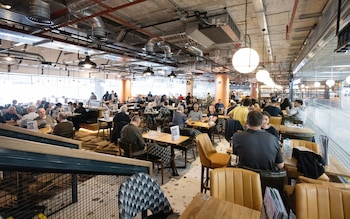Saudi Arabia’s new luxury airline Riyadh Air is fuelling a war for talent in the aviation industry as it poaches British pilots.
The British Airline Pilots’ Association (Balpa) said the impact of a recruitment drive by Riyadh Air, together with Emirates, Qatar Airways and Etihad, was being felt at carriers including British Airways, Virgin Atlantic and easyJet.
Large numbers of pilots retired during Covid, forcing airlines worldwide into a battle to retain captains and first officers.
Amy Leversidge, the Balpa general secretary, told The Telegraph that wealthy Gulf carriers were making it harder for British carriers to retain staff by offering generous salaries and benefits.
She said: “There are airlines in the Middle East that are trying to recruit, and not just Riyadh Air. We keep hearing stories of them hosting events to try and get pilots to go over.
“We are seeing pilots saying that they are moving from airline to airline. Not in massive numbers, but big numbers for aviation.”
Emirates, Qatar Airways and Etihad all recently staged recruitment roadshows in the UK, seeking to lure British pilots with the offer of high salaries, according to Balpa.
Riyadh Air, in particular is recruiting heavily as it seeks to build an entire airline from scratch. Crown Prince Mohammed bin Salman, the Saudi ruler, announced the creation of Riyadh Air last year as part of efforts to diversify the Kingdom’s economy away from oil.
The company is headed up by British aviation veteran Tony Douglas.

A spokesman said news of Riyadh Air’s impending launch had been enough to trigger a flurry of inbound interest from pilots, with 15,000 applications received from across the world.
Riyadh Air’s pilot team includes a former chief pilot from Virgin, which last week signed a cooperation pact with the Middle Eastern carrier after announcing a new route to the Saudi capital.
Riyadh Air has hired 29 management and instructor pilots and will commence large-scale recruitment at the end of 2024 to meet a requirement for 700 flight crew within three years. It’s likely to need 1,000 more than that for the fleet of 200 jets envisaged after five years.
British Airways and Virgin have both hosted events of their own in the Gulf in response to the competition for staff, targeting pilots seeking a change of scenery. However, takeup was disappointingly low as people were generally unwilling to turn their back on the region’s generous tax regimes, the union said.
Ms Leversidge said that if UK airlines start haemorrhaging staff in greater numbers they will need to do “a huge amount of work to attract people back in.”
She said: “Airlines need to focus on retention and that’s an argument we’re making in our negotiations. They need to look for the early warning signs that people might not be happy, for example in the results of employee-engagement surveys.
“It’s no good waiting until the figures show that you have a problem, because by then it’s already too late. There is loyalty there and pilots do closely identify with the airlines they fly for. But we are in a buyers market.”
Balpa has negotiated three-year pay deals with BA, Virgin, easyJet, Ryanair and Tui since the start of 2023. While those accords provide some assurance, airlines need to offer other inducements and embrace greater flexibility to maximise their appeal, Ms Leversidge said.
She said: “It’s not necessarily that people are wanting to make that move. You can see the attraction, but there are considerations beyond pay. Family life and all those sorts of things.
“So employers need to consider their scheduling arrangements, how they treat things like fatigue, and the general work-life balance.”
Disclaimer: The copyright of this article belongs to the original author. Reposting this article is solely for the purpose of information dissemination and does not constitute any investment advice. If there is any infringement, please contact us immediately. We will make corrections or deletions as necessary. Thank you.


